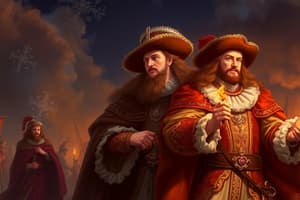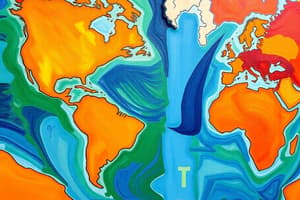Podcast
Questions and Answers
What is another name for the Age of Exploration?
What is another name for the Age of Exploration?
- The Renaissance Period
- The Age of Discovery (correct)
- The Industrial Revolution Age
- The Era of Enlightenment
Which event disrupted the spice and silk trades, prompting European powers to seek alternative routes?
Which event disrupted the spice and silk trades, prompting European powers to seek alternative routes?
- The Fall of Constantinople (correct)
- The French Revolution
- The Fall of Rome
- The Hundred Years' War
Who sponsored Christopher Columbus's westward voyage across the Atlantic Ocean?
Who sponsored Christopher Columbus's westward voyage across the Atlantic Ocean?
- King Henry VIII
- King Ferdinand II and Queen Isabella I (correct)
- Queen Elizabeth I
- King Louis XIV
Which country did Vasco da Gama represent during his influential voyage to India in 1498?
Which country did Vasco da Gama represent during his influential voyage to India in 1498?
What key factor contributed to the start of the Age of Exploration by disrupting safe land routes for European traders?
What key factor contributed to the start of the Age of Exploration by disrupting safe land routes for European traders?
Why were Portugal and Spain eager to find alternative trade routes during the Age of Exploration?
Why were Portugal and Spain eager to find alternative trade routes during the Age of Exploration?
Who led the first successful circumnavigation of the globe starting in 1519?
Who led the first successful circumnavigation of the globe starting in 1519?
What did explorers do as they ventured to new lands?
What did explorers do as they ventured to new lands?
Which technological advancement was crucial for explorers in undertaking longer voyages?
Which technological advancement was crucial for explorers in undertaking longer voyages?
When did the Age of Exploration approximately come to an end?
When did the Age of Exploration approximately come to an end?
What lasting effects did the Age of Exploration have on international relations?
What lasting effects did the Age of Exploration have on international relations?
Which explorer chronicled the arrival of Spanish conquistadors in the Americas?
Which explorer chronicled the arrival of Spanish conquistadors in the Americas?
Flashcards are hidden until you start studying
Study Notes
The Age of Exploration
The Age of Exploration, also known as the Age of Discovery, refers to the period from the early 15th century to the 17th century when European powers embarked on voyages to explore the world and establish new trade routes. This era transformed global geopolitics, culture, and commerce, forever changing the face of our planet.
Origins of the Age of Exploration
The Age of Exploration was driven by several factors. One key factor was the fragmentation of the Mongol Empire, which previously secured safe passage for European traders along traditional land routes. Additionally, the rise of new European nations like Portugal and Spain saw them seeking opportunities to expand their influence and economic gain. These countries were particularly keen on finding alternative routes to the lucrative spice and silk trades, which were disrupted by the fall of Constantinople in 1453.
Noteworthy Figures and Journeys
Several notable individuals played crucial roles in the Age of Exploration. Christopher Columbus, a Genoese navigator sponsored by Queen Isabella I of Castile and King Ferdinand II of Aragon, famously sailed westward across the Atlantic Ocean in search of a quicker route to the East Indies. His journey resulted in the discovery of the Americas in 1492. Another influential figure was Vasco da Gama, whose 1498 voyage marked the first direct passage from Europe to India, establishing Portugal as a dominant force in Indian Ocean trade.
Other prominent explorers include Ferdinand Magellan, who led the first successful circumnavigation of the globe starting in 1519, and Bartolomé de las Casas, a Dominican friar who chronicled the arrival of Spanish conquistadors in the Americas.
Impact on Geography and Science
The Age of Exploration significantly advanced geographical knowledge. As explorers ventured to new lands, they collected data, produced accurate maps, and documented diverse cultures and ecosystems. This information contributed to the development of modern geography and the concept of global interconnectedness. Furthermore, scientific and technological advancements in navigation, cartography, and shipbuilding enabled explorers to undertake longer voyages, pushing the boundaries of what was possible at the time.
Lasting Effects
The Age of Exploration continued until the early 17th century, with the establishment of permanent settlements and colonies facilitating the exchange of goods and ideas among different parts of the world. While exploration did not completely stop after this period, it shifted focus towards territorial expansion and resource exploitation. The legacy of the Age of Exploration continues to shape international relations, economies, and societies worldwide.
Studying That Suits You
Use AI to generate personalized quizzes and flashcards to suit your learning preferences.




